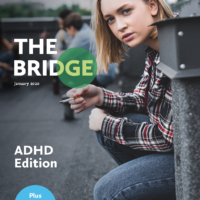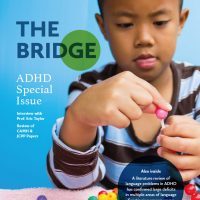ADHD (Attention-deficit hyperactivity disorder)
-

January 2020 issue – The Bridge ADHD edition
Special edition of The Bridge on ADHD, includes guidelines on service transition for young people, substance use, emotional impulsivity, emotion dysregulation, diagnosis and misdiagnosis.
Read more -

JCPP Editorial: Volume 61, Issue 01, January 2020
“‘People get ready’: Are mental disorder diagnostics ripe for a Kuhnian revolution?” by Edmund Sonuga-Barke
Read more -

Attention Deficit Hyperactivity Disorder (ADHD) in Children and Young People
ADHD is a behavioural disorder with three key aspects, inattention, hyperactivity, and impulsivity. It is very common for ADHD in children to present together with other developmental and/or mental health problems, such as oppositional and attachment disorders, Tourette’s syndrome, autism spectrum disorders and anxiety disorders.
Read more -

ADHD 2017 Editorial
Editorial introducing a summary of recent research from the JCCP/CAMH in Attention Deficity Hyperactivity Disorder (ADHD).
Read more -

Age-related immaturity in the classroom can lead to ADHD misdiagnosis
Researchers from Australia, France, the USA and the UK have come together to compile a 2019 Annual Research Review for the Journal of Child Psychology and Psychiatry on the correlation between a late birth-date (relative to the school year) and risk of attention-deficit/hyperactivity disorder (ADHD).
Read more -

Should emotion dysregulation be considered a core component of ADHD?
New data from researchers in the USA suggest that emotion dysregulation should be included as a core component of attention-deficit/hyperactivity disorder (ADHD) rather than viewed as comorbidity.
Read more -

New developmentally appropriate diagnostic criteria need to be established to identify ADHD early in preschoolers
Attention-deficit/hyperactivity disorder (ADHD) typically emerges during preschool years and in a subset of children, can persist into adolescence. Early identification might help promote a favourable ADHD trajectory, but the current predictors of ADHD persistence are insufficient.
Read more -

Emotional impulsivity and deficient emotional self-regulation might be core symptoms of ADHD
A large proportion of children with attention-deficit/hyperactivity disorder (ADHD) exhibit notable emotion-related problems (or “emotional symptoms”). These emotional symptoms seem to associate with poor quality of life, impaired social adjustment and reduced marital status.
Read more -

Gender-specific pathways mediate the risk of substance use in adolescents with ADHD
Data suggest that children with attention-deficit/hyperactivity disorder (ADHD) are more likely to start smoking tobacco and/or marijuana earlier in childhood than unaffected children, and then escalate use during adolescence. Now, a study by researchers at the University of Minnesota has examined the mediating pathways underlying this association between childhood ADHD and later substance-abuse problems.
Read more -

Guidelines on service transition for young people with ADHD
Recent research has led to the increasing recognition that ADHD can often be a life span disorder, meaning that a subset of affected children will eventually need to transition to adult services. Unfortunately, much research has highlighted the difficulties experienced by young people in transitioning from children’s to adult services.
Read more